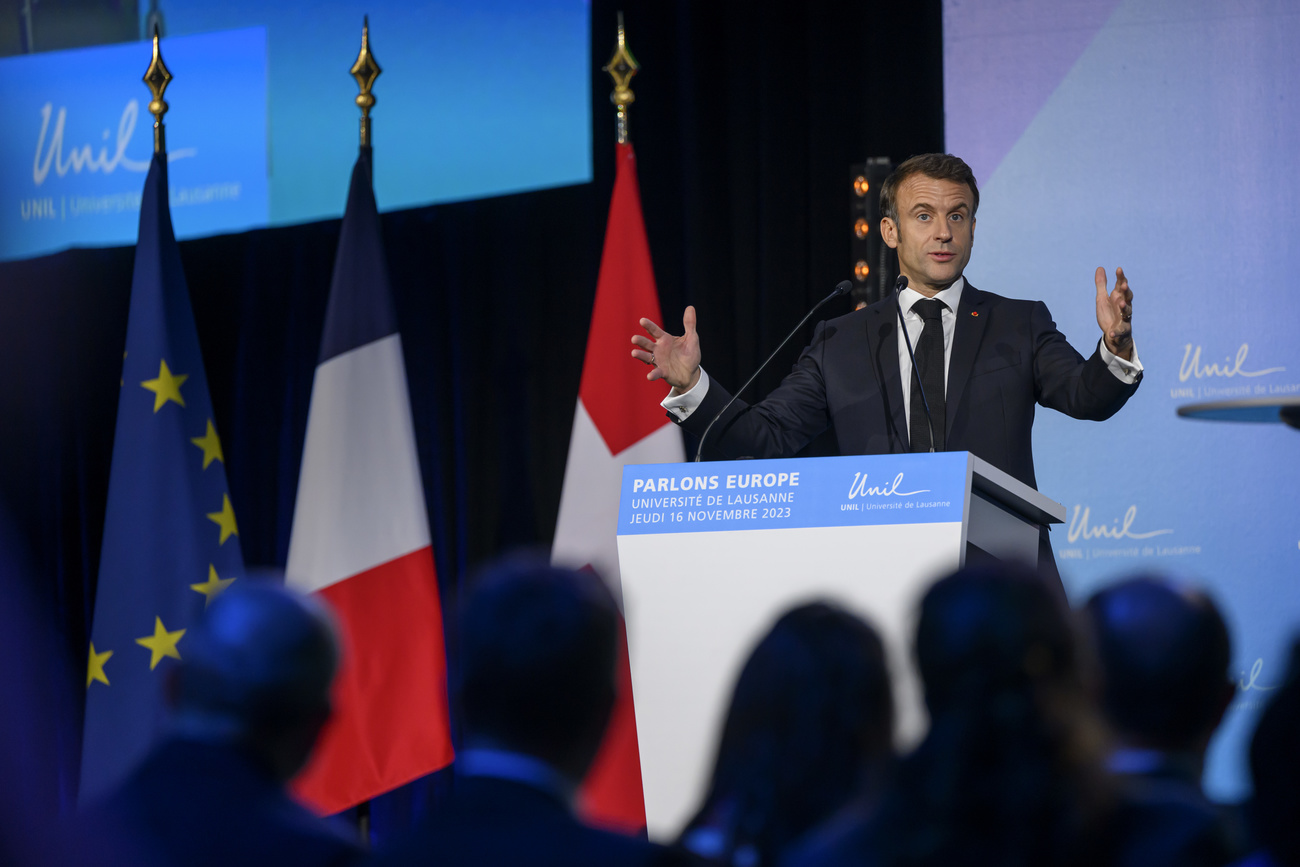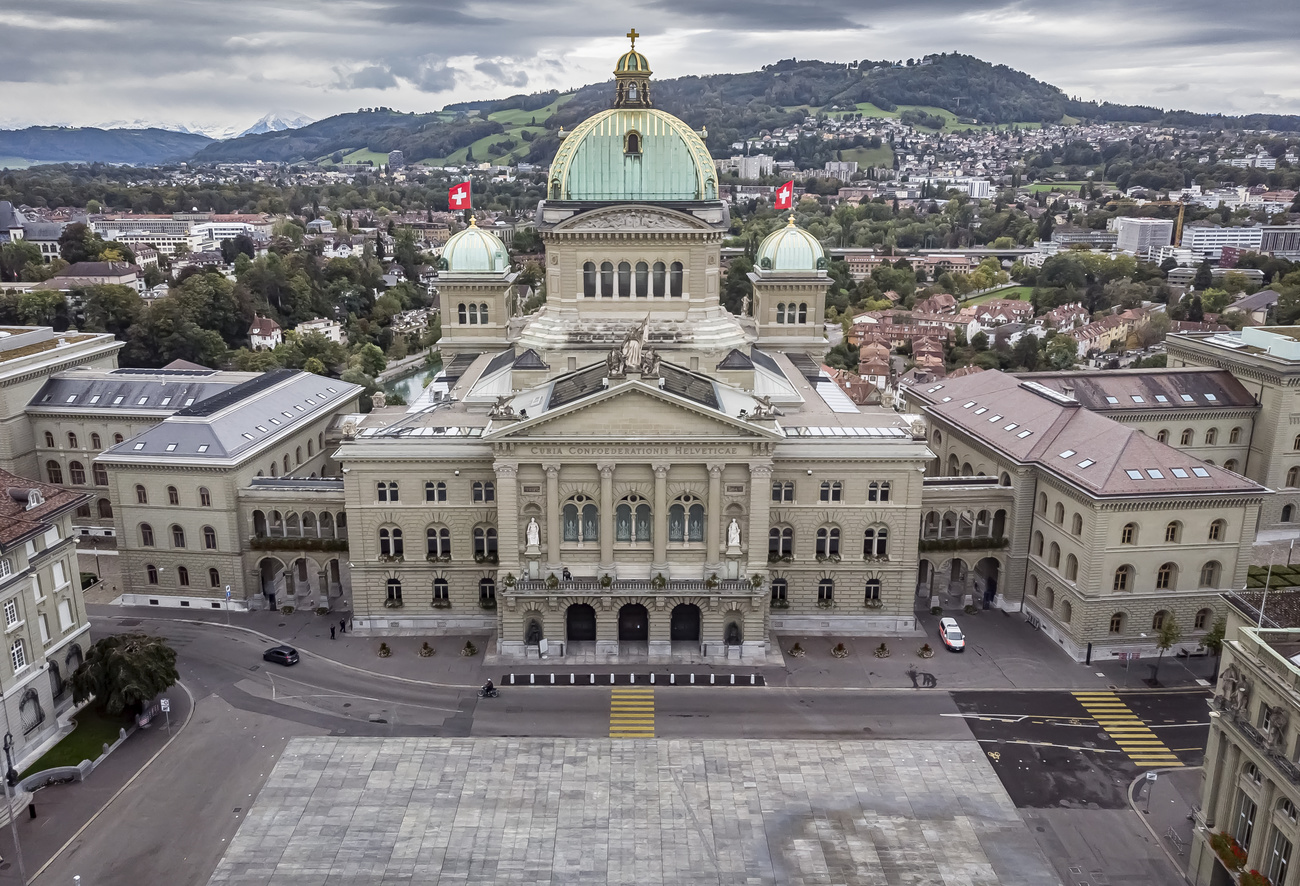
France’s Macron pleads for European unity during Swiss visit

French President Emmanuel Macron, who is currently on a two-day state visit to Switzerland, has defended Europe as a “response” to geopolitical crises but admits the continent remains divided over the Israeli-Palestinian war.
Accompanied by his Swiss counterpart Alain Berset, Macron presented his vision of Europe to students at the University of Lausanne on Thursday. This was followed by a debate.
Outside the campus, around 200 pro-Palestinian demonstrators denounced the position of France and Macron on the Middle East. After a tense moment with the police, relative calm returned.
Inside, a packed amphitheatre of students, who had had to pass draconian checks to gain access, listened to Macron’s speech. There were no flags or banners, and the debate was polite. The only question on the subject was put in writing. “We find it very difficult to understand your positions”, said the moderator, eliciting applause.
+ Macron in Switzerland: ‘you may not know it, but you are also Europeans’
Despite the “position of unity” displayed by the European Union, “there are many differences on this issue between the countries” that make up the EU, said Macron.
As he had done the day before in front of the press, the French president said he “fully assumes” his position, which has drawn criticism, sometimes for opposing reasons, in France and in the region.
“Israel’s right to defend itself does not justify bombing civilians and having children and families killed in these bombardments,” he said. “It cannot be total war, with no rules,” insisted the French president.
+ Macron’s trip to Switzerland confirms ‘bilateral warming’
He called for an “immediate truce leading to a humanitarian ceasefire”, but agreed that “there is no united position, to be honest, at European level”.
On the question of Europe, Swiss President Alain Berset reminded that Switzerland is “already closely linked” to the continent. Without being politically integrated into Europe, Switzerland shares its values, he declared.

More
Swiss government decides to draw up negotiating mandate with EU
But while the European project has long been presented as a guarantee of peace on a continent previously plagued by conflict, “war is returning everywhere on our doorstep”, in Ukraine, the Caucasus and the Middle East, said Macron.
“Faced with all the risks – of being torn apart, of a return to nationalism – Europe is the answer,” he insisted. “To think that, in the face of all these challenges, the answer would be to return to nationalism, to conflict between one country and another would be a catastrophe.”
“And so, we have, even more than before the return of war to our soil, a need for unity,” he concluded.
This is a line he is likely to repeat in the coming months in the run-up to the European elections in June, for which his centrist, pro-European camp is currently outpaced in the polls by the far right.
According to Macron, this “unity” will be achieved by enlarging the EU and reforming it so that it operates with 30 or 35 members, but it is also possible for countries such as Switzerland that do not wish to join to sign up to his European Political Community initiative, “concrete projects” and “ambitious association agreements”.
The agreement between Bern and Brussels has been languishing for years, but negotiations look set to be relaunched, and the French president called for them to be speeded up during his two-day state visit on Wednesday and Thursday.
This news story has been written and carefully fact-checked by an external editorial team. At SWI swissinfo.ch we select the most relevant news for an international audience and use automatic translation tools such as DeepL to translate it into English. Providing you with automatically translated news gives us the time to write more in-depth articles. You can find them here.
If you want to know more about how we work, have a look here, and if you have feedback on this news story please write to english@swissinfo.ch.

In compliance with the JTI standards
More: SWI swissinfo.ch certified by the Journalism Trust Initiative





























You can find an overview of ongoing debates with our journalists here . Please join us!
If you want to start a conversation about a topic raised in this article or want to report factual errors, email us at english@swissinfo.ch.